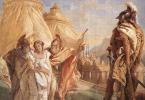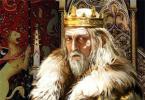The plots of the famous works “Iliad” and “Odyssey” are taken from a general collection of epic tales about the Trojan War. And each of these two poems represents a small sketch from a larger cycle. The main element in which the characters of the work “Iliad” operate is war, which is depicted not as a clash of the masses, but as the actions of individual characters.
Achilles
The main character of the Iliad is Achilles, a young hero, the son of Peleus and the goddess of the sea, Thetis. The word "Achilles" is translated as "swift-footed, like a god." Achilles is the central character of the work. He has an integral and noble character, which personifies real valor, as the Greeks then understood it. For Achilles there is nothing higher than duty and honor. He is ready to avenge the death of his friend by sacrificing his own life. At the same time, duplicity and cunning are alien to Achilles. Despite his honesty and sincerity, he acts as an impatient and very hot-tempered hero. He is sensitive in matters of honor - despite the serious consequences for the army, he refuses to continue the battle because of the insult caused to him. In the life of Achilles, the dictates of heaven and the passions of his own existence coincide. The hero dreams of fame, and for this he is also ready to sacrifice his own life.
Confrontation in the soul of the main character
Achilles, the main character of the Iliad, is used to commanding and managing, as he is aware of his strength. He is ready to destroy Agamemnon on the spot, who dared to insult him. And Achilles' anger manifests itself in a variety of forms. When he takes revenge on his enemies for Patroclus, he turns into a real demon-destroyer. Having filled the entire bank of the river with the corpses of his enemies, Achilles enters into battle with the god of this river himself. However, it is very interesting to see how Achilles' heart softens when he sees his father asking for his son's body. The old man reminds him of his own father, and the cruel warrior softens. Achilles also bitterly misses his friend and sobs at his mother. Nobility and the desire for revenge fight in the heart of Achilles.

Hector
Continuing to characterize the main characters of Homer's Iliad, it is worth dwelling in particular detail on the figure of Hector. The bravery and courage of this hero are the result of the good will prevailing in his consciousness. He knows the feeling of fear, like any other warrior. However, despite this, Hector learned to show courage in battles and overcome cowardice. With sadness in his heart, he leaves his parents, son and wife, as he is faithful to his duty - to protect the city of Troy.
Hector is deprived of the help of the gods, so he is forced to give his own life for his city. He is also depicted as humane - he never reproaches Elena and forgives his brother. Hector does not hate them, despite the fact that they were the ones responsible for the outbreak of the Trojan War. There is no disdain for other people in the hero’s words; he does not express his superiority. The main difference between Hector and Achilles is humanity. This quality is contrasted with the excessive aggressiveness of the protagonist of the poem.

Achilles and Hector: comparison
A frequent task is also a comparative description of the main characters of the Iliad - Achilles and Hector. Homer gives more positive, humane traits to the son of Priam than to the main character. Hector knows what social responsibility is. He does not put his experiences above the lives of other people. In contrast, Achilles is the true personification of individualism. He elevates his conflict with Agamemnon to truly cosmic proportions. In Hector, the reader does not observe the bloodthirstiness that is inherent in Achilles. He is an opponent of war, he understands what a terrible disaster it turns out to be for people. The whole disgusting and terrible side of the war is clear to Hector. It is this hero who proposes not to fight with whole troops, but to field separate representatives from each side.
Hector is helped by the gods Apollo and Artemis. However, he is very different from Achilles, who is the son of the goddess Thetis. Achilles is not exposed to weapons; his only weak point is the heel. In fact, he is a half-demon. When preparing for battle, he puts on the armor of Hephaestus himself. And Hector is a simple man who faces a terrible test. He realizes that he can only answer the challenge, because the goddess Athena is helping his enemy. the characters are very different. The Iliad begins with the name of Achilles, and ends with the name of Hector.

Element of heroes
A description of the main characters of Homer's poem "The Iliad" would be incomplete without characterizing the environment in which the action of the poem takes place. As already indicated, such an environment is war. In many places in the poem, the exploits of individual characters are mentioned: Menelaus, Diomedes. However, the most significant feat is still the victory of Achilles over his opponent Hector.
The warrior also wants to know for sure who exactly he is dealing with. In some cases, the confrontation stops for a while, and to ensure freedom for the warriors, as well as non-interference by outsiders, the truce is consecrated with sacrifices. Homer, who lived in an environment of war and constant murder, expressively depicts the dying torment of the dying. The cruelty of the victors is no less vividly depicted in the poem.

Menelaus and Agamemnon
One of the main characters of the Iliad is the Mycenaean and Spartan ruler Menelaus. Homer portrays both as not the most attractive characters - both do not miss the opportunity to abuse their position, especially Agamemnon. It was his selfishness that caused the death of Achilles. And Menelaus’s interest in the attack was the reason that the war broke out.
Menelaus, whom the Achaeans supported in battles, was supposed to take the place of the Mycenaean ruler. However, he turns out to be unsuitable for this role, and this place turns out to be occupied by Agamemnon. Fighting with Paris, he gives vent to his anger, which has accumulated against his offender. However, as a warrior he is significantly inferior to the other heroes of the poem. His actions prove significant only in the process of saving the body of Patroclus.
Other heroes
One of the most charming main characters of the Iliad is the old man Nestor, who loves to constantly remember the years of his youth and give his instructions to young warriors. Also attractive is Ajax, who with his courage and strength surpasses everyone except Achilles. Patroclus, Achilles’s closest friend, who was raised with him under the same roof, also evokes admiration. While performing his exploits, he became too carried away by the dream of capturing Troy and died at the merciless hand of Hector.
An elderly Trojan ruler named Priam is not the main character of Homer's Iliad, but he has attractive features. He is a true patriarch who is surrounded by a large family. Having grown old, Priam cedes the right to command the army to his son, Hector. On behalf of all his people, the elder makes sacrifices to the gods. Priam is distinguished by such character traits as gentleness and courtesy. He even treats Elena, whom everyone hates, well. However, the old man is haunted by misfortune. All his sons die in battle at the hands of Achilles.

Andromache
The main characters of the poem “Iliad” are warriors, but in the work you can also find many female characters. This is named Andromache, his mother Hecuba, as well as Helen and the captive Briseis. The reader first meets Andromache in the sixth canto, which tells of her meeting with her husband, who returned from the battlefield. Already at that moment, she intuitively senses Hector’s death and persuades him not to leave the city. But Hector does not heed her words.
Andromache is a faithful and loving wife who is forced to live in constant worry for her husband. The fate of this woman is filled with tragedy. When her hometown of Thebes was sacked, Andromache's mother and brothers were killed by enemies. After this event, her mother also dies, Andromache is left alone. Now the whole meaning of her existence is in her beloved husband. After she says goodbye to him, she mourns him along with the maids as if he had already died. After this, Andromache does not appear on the pages of the poem until the death of the hero. Sorrow is the main mood of the heroine. She foresees her bitter lot in advance. When Andromache hears screams on the wall and runs to find out what happened, she sees: Achilles dragging Hector’s body along the ground. She falls unconscious.

Heroes of the Odyssey
A common question that students are asked in literature classes is to name the main characters of the Iliad and the Odyssey. The poem “The Odyssey,” along with the “Iliad,” is considered to be the most important monument of the entire era of transition from the communal clan to the slave system.
The Odyssey describes even more mythological creatures than the Iliad. Gods, people, fairy-tale creatures - Homer's Iliad and Odyssey are full of a variety of characters. The main characters of the works are both people and gods. Moreover, the gods take an active part in the lives of mere mortals, helping them or taking away their power. The main character of the Odyssey is the Greek king Odysseus, who returns home after a battle. Among other characters, his patron, the goddess of wisdom Athena, stands out. Opposing the main character is the sea god Poseidon. An important figure is the faithful Penelope, the wife of Odysseus.
Hi all! Today I am with you, Elvira Baryakina, and the “Writer's Handbook”.
I will tell you about a very interesting literary technique: how to introduce a hero without spending a lot of effort, words and the reader’s time on it.
Designating the character
First, we need to identify the hero. For example, we can say that the head of the border post is sitting in the room, and readers will immediately have a certain image in their heads. This will happen because behind the very definition of “head of the outpost” there is a whole trail of details that we know from books, films, etc.
We designate the environment in which the character finds himself
For example, we can place the head of a border post in his office.
Do we need details - what exactly does this room look like? Probably not. The most important thing is to describe the light and smells. For example, the room may be flooded with midday sun, and the air may smell of heated dust. And there is no longer any need to explain anything - the image has already been created.
Unusual action or object
How do we show the character's character? There is a clever trick for this: we can give the hero an object that does not fit with his image, or force him to do something unusual for him.
Let the head of the outpost watch cartoons: they say, nostalgia has overwhelmed the person.
New character
We introduce another character, and the reaction of the first character will determine his character.
Let's say a subordinate enters the office of the head of the outpost. We indicate what relationships exist between them: bad, good, with some special specifics, etc.
Hero's reaction
Now let’s look at the options for the outpost commander’s actions:
* Turn off the TV and take an important pose. This is what a person would do for whom it is important what impression he makes.
* Leave the TV on - as is. This is what a person would do if he doesn’t care what his subordinate thinks about him.
* Get embarrassed and hastily switch to the first channel you come across - and make a mistake. Let's say the boss wanted to turn on the news, but ended up watching a porn film. We show the reaction to the mistake: the boss panics, and comical notes appear in the plot.
In any of the above situations, the boss will show himself completely differently: he will have a different character and a different attitude. That is, the reaction to external challenges - even the most insignificant ones - will determine what a given character is like.
Shakespeare is a writer who wrote many beautiful works that are known throughout the world. One of such works is the play “Hamlet”, where different destinies are intertwined and social and political issues of the 16th-17th centuries are touched upon. Here the tragedy shows both betrayal and the desire to restore justice. While reading the work, the characters and I experience and feel their pain and loss.
Shakespeare Hamlet the main characters of the work
In his work “Hamlet,” Shakespeare created different heroes whose images are ambiguous. Each hero of Shakespeare's tragedy Hamlet is a separate world, with its own shortcomings and positive aspects. Shakespeare in the tragedy “Hamlet” created a variety of heroes in the work, where there are both positive and negative images.
Images of heroes and their characteristics
So, in the work we meet Gertrude, Hamlet’s mother, who was smart, but weak-willed. Immediately after the death of her husband, she marries his killer. She does not know the feeling of maternal love, so she easily agrees to become Claudius’ accomplice. And only after she drank the poison that was intended for her son, she realized her mistake, realized how wise and fair her son was.
Ophelia, the girl who loved Hamlet until her last breath. She lived surrounded by lies and espionage, and was a toy in the hands of her father. In the end, she goes crazy because she couldn’t bear the trials that befell her.
Claudius commits fratricide in order to achieve his goals. A sneaky, cunning, hypocrite who was also smart. This character has a conscience and it also torments him, not allowing him to fully enjoy his dirty achievements.
Rosencrantz and Guildenstern are a vivid example of what true friends should not be, because friends do not betray, but here, while characterizing the heroes of Shakespeare’s Hamlet, we see that these heroes easily betray the prince by becoming spies for Claudius. They easily agree to deliver the message, which talks about the murder of Hamlet. But in the end, fate does not play into their hands, because in the end it is not Hamlet who dies, but they themselves.
Horatio, on the contrary, is a true friend to the last. He, together with Hamlet, experiences all his anxieties and doubts and asks Hamlet, after feeling the inevitable tragic end, to breathe some more in this world and tell everything about it.
In general, all the characters are bright, unforgettable, unique in their own way, and among them, of course, it is impossible not to recall in Shakespeare’s work “Hamlet” the image of the main character himself, that same Hamlet - the Danish prince. This hero is multifaceted and has an extensive image that is filled with life content. Here we see Hamlet’s hatred for Claudius, while he treats the actors wonderfully. He can be rude, as in the case of Ophelia, and he can be courteous, as in the case of Horatio. Hamlet is witty, wields a sword well, he is afraid of God's punishment, but at the same time, he blasphemes. He loves his mother, despite her attitude. Hamlet is indifferent to the throne, always remembers his father with pride, thinks and reflects a lot. He is smart, not arrogant, lives by his thoughts, is guided by his judgment. In a word, in the image of Hamlet we see the versatility of the human personality, who thought about the meaning of human existence, which is why he pronounces the well-known monologue: “To be or not to be, that is the question.”
Characteristics of characters based on Shakespeare's work "HAMLET"
4 (80%) 3 votes  Characteristics of heroes based on Shakespeare's work "King Lear" - Lear
Characteristics of heroes based on Shakespeare's work "King Lear" - Lear  Characteristics of the heroes based on the work “The Song of Roland”, Olivier
Characteristics of the heroes based on the work “The Song of Roland”, Olivier
The captain's daughter, the main characters and their characteristics (table) - briefly about each character with a description of character and literary biography. Thanks to this table, you don’t even have to read Pushkin’s “The Captain’s Daughter”; it is suitable for composing and quickly analyzing each character.
|
External details |
Character |
|
|
Petr Andreevich Grinev |
The main character. The 16-year-old son of a wealthy landowner, a former military man, a nobleman. |
He has kindness, honesty, courage, a pure soul, but due to his young years, he is very inexperienced in life situations. He is principled, although he loves to show off and show off. |
|
Masha Mironova |
The captain's daughter (hence the title of the novel), beautiful, but poor. In all likelihood, a virgin. |
Modest, bashful, kind and generous. Very sweet, emotional, ambitious. |
|
Savelich, aka Arkhip Savelyev |
Old serf of the Grinevs. Mentor of Peter Grinev. A shuffling old rascal. |
Thrifty, thrifty, but kind and loving. Savelich is ready to give his life for Peter, but also for his junk. |
|
Emelyan Pugachev |
Chief revolutionary, Don Cossack, impostor, bandit, socialist. |
Cruel, but with signs of generosity. Extremely vain. Loves honesty and sincerity in people. |
|
Well done officer, male, rich traitor, hunter of the Machine's cap. |
A vile and low man, cowardly, short-haired, loser, cunning Pinocchio. |
|
|
Captain Mironov |
Masha's dad. An experienced military man, but a bit old. |
Henpecked, but a brave and kind man who was not afraid of death and did not renounce the Fatherland and service. |
|
Vasilisa Egorovna |
Captain Mironov's wife, Masha's mother. |
A kind but powerful woman. Economic. |
|
Ivan Zurin |
A 35-year-old officer, Grinev’s new friend, whom he met while playing billiards. |
Reveler, cunning, loves to drink and party. But - an honest hussar, he did not put Grinev in his cap, but helped him. |
These are the main characters of The Captain's Daughter, and there are also minor ones:
- Andrey Petrovich Grinev- Peter's father, a very strict former military man, but an easy-going comrade. He has a very strong character, but is very hot; the person is constantly busy with his own worries, so sometimes he makes mistakes and does not go into details.
- Avdotya Vasilievna- wife of the elder Grinev and mother of Peter. From a poor family, kind and humane.
- Beaupré- a perpetually drunk Frenchman who was hired to train Peter. A womanizer and a goofball. As soon as Andrei Petrovich found Beaupre in an indecent state, he drove him away with urine rags, and appointed Savelich instead.
In the main characters of The Captain's Daughter, Pushkin embodied his best qualities as a prose writer; despite the tragedy of the story, it evokes surprisingly kind feelings, and some places are permeated with light irony.
The main characters of Pushkin's "The Young Lady of the Peasant" live during the times of the nobility of the 19th century and are forced to comply with the principles of society.
The main characters of the story “The Peasant Young Lady”
- Ivan Petrovich Berestov,
- his son Alexey is the son of Ivan Berestov,
- Grigory Ivanovich Muromsky - neighbor landowner, Anglomaniac landowner, “a real Russian gentleman”
- Lisa- daughter of Muromsky.
Lisa Muromtseva- the daughter of a wealthy Anglomaniac landowner Grigory Ivanovich Muromsky, Alexei’s beloved.
“She was 17 years old. Her dark eyes enlivened her dark and very pleasant face. She was the only child and therefore a spoiled one.”
The girl was raised by her father, assisted by an English nanny, Miss Jackson. Lisa was a romantic person, but she was very smart. To meet the son of landowner Ivan Petrovich Berestov, Lisa introduced herself as the blacksmith’s daughter, Akulina. They walked, he taught her and was delighted with her intelligence. Lisa, who introduced herself as a peasant, charmed Alexei because she was an intelligent, resourceful, natural, kind and decent girl with a sense of dignity.
When her father invited the Berestovs to dinner, Lisa was scared, but came up with a way out of the current situation. She dressed up and pretty much whitened her face, so Alexey didn’t recognize her. He learned the truth when their fathers decided to marry them. Alexey came to the Muromtsevs to explain that he loves the daughter of the blacksmith Akulin, but cannot marry Lisa. Having learned that Lisa was the same Akulina, he was very surprised and delighted.
Alexey Berestov- Vstudied at the university. “Well done,” “handsome, slim, tall, blush all over his cheek.” Plays burners with the peasants. Lisa liked him because he was sincere and was not proud of his origin and wealth.
“He was brought up at ... the university and intended to enter military service, but his father did not agree ... They were not inferior to each other, and young Alexei began to live for the time being as a master, growing a mustache just in case (an attribute of the military)”
“Surprisingly good, handsome, one might say. Slender, tall, blush all over his cheek..."
“...so kind, so cheerful”
Ivan Petrovich Berestov- a Russian nobleman who runs a household according to the Russian model. He is a reasonable person, a good father, a hospitable host. Berestov is proud of his cloth factory and rich estate, but thinks only about profit.
« In my youth he served in the guard , retired early in 1797, went to his village and since then he has not left there. He was married to a poor noblewoman , which died in childbirth , while he was in the departing field.
Household exercises he was soon consoled. He lined up house according to my own plan, I startedcloth factory , tripled income and began to consider himself the smartest person all over the area..."
Grigory Ivanovich Muromsky- “he was a real Russian gentleman,” but he did everything in the English manner. Both types of landowners are characteristic of the landed nobility of that time in the 19th century. He's in He introduced something new all the time, but he was a good father. But Muromsky lives beyond his means and does not run his household very wisely.
"This one was real Russian gentleman . Having squandered big in Moscow part of the estate his and widowed at that time , he left last your village , where p continued play tricks , but in a new way.
He cheated english garden , to which spent almost everything other income.
U his daughter was an English madam . He cultivated his fields English method and despite significant cost reductions, Grigory Ivanovich’s income did not increase ; he is in the villagefound a way to incur new debts ; with all that was considered a man not stupid …»



